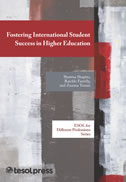Quick Tip: M is for Motivation
by Sarah Sahr
Audience: All levels of teachers and students
During the 2008–2009 school year, I worked as an English advisory teacher at AL Wajbah Primary Independent Girls School, in Doha, Qatar. I assisted many groups of professionals in this school including English, Arabic, and physical education teachers; media specialists; and school administrators. In May of 2009, I helped develop a school-wide workshop on motivation. After the workshop, teachers compiled a summary of key points for distribution to the school with some key findings and highlights. I’d like to share some of those findings with you here. It might be just what you need to keep both teachers and students motivated!
Suggestions on How YOU Can Motivate Students to Continuously Improve
- Create an environment that is open and positive: Your classrooms should reflect an environment that allows students the ability to speak freely and to have a sense of personal ownership in what takes place there. Help students find personal meaning and value in learning. Decorate your walls with useful, engaging information, not just the latest trendy comic characters. And, of course, you can always give snacks and other rewards, and send positive messages home.
- Increase student success by assigning task that are neither too easy nor too difficult: Often, problems from classroom management stems from students being disengaged with school work. Make sure to differentiate instruction based on the level of each student. Set achievable timelines and deadlines for tasks. Work with your students to find the right instructional balance.
Suggestions on How YOU Can Motivate Yourself to Continuously Improve
- Never say “no” to professional development (PD): And by PD, I mean all PD. Walk to a teacher’s classroom down the hall and talk about the current initiatives in the school. Search the Internet for communities of practice that interest you and you can participate in. If comfortable, ask selective students how you, as a teacher, could improve. Sometimes the greatest PD is closer than you think.
- Celebrate small victories! If a challenging student finally sees the light, tell your colleagues. If a class has had an amazing week and met all lesson outcomes, include them in the celebration by allowing a homework pass or 30-minutes of controlled “down time” where students can relax. And, when taking a vacation, sincerely take a vacation and disconnect. Leave school work at school.
As a reminder, these teaching tips come from an amazing group of primary school teachers in Doha, Qatar. Although they might have a different teaching experience, I think we can all take some of their advice.
___________________
Sarah Sahr is the director of education programs at TESOL and is currently pursuing her doctorate in education administration and policy at the George Washington University.
TC Monthly Giveaway Congratulations to Robert Powell of Winston-Salem, North Carolina, USA, for being the winner of the October 2014 TESOL Connections Monthly Giveaway. Robert won a free registration to the 2015 TESOL Annual Convention & English Language Expo in Toronto Canada.
This month, TESOL is giving away
a free copy of
Language Teaching Insights From Other Fields:
Sports, Arts, Design, and More.
There will be three lucky winners!

How would a restaurant reviewer critique an essay? How would a martial arts master facilitate language practice? How would a bartender create a supportive environment for learning? And how would a social activist promote critical thinking in the classroom? Answers to these questions and more can be found in chapters that offer practical tips from language teachers with extensive experience in other fields. It is a book full of surprises that translate into new ways of thinking about teaching and the classroom.
Read more about the book and get a sample chapter from the TESOL Bookstore.
Click here to enter
Drawing closes 27 November 2014, 11:59 pm EST
TESOL Blogs Interested in writing a blog for TESOL?
Contact Tomiko Breland with your idea or for submission details.
Check out the latest TESOL Blogs:
|
8 Major Trends in the Global ELT Field, by Yilin Sun
 TESOL President's Blog: Recently, I have been invited to share my perspectives on major trends in the global ELT field at several international conferences. Here’s a summary of what I shared with the participants—of course this isn’t a comprehensive list. I think that trends in today’s ELT field can be broken down into three major categories: globalization, localization, and interdisciplinary collaboration. I’d love to hear your thoughts on current trends, as well. Read More. TESOL President's Blog: Recently, I have been invited to share my perspectives on major trends in the global ELT field at several international conferences. Here’s a summary of what I shared with the participants—of course this isn’t a comprehensive list. I think that trends in today’s ELT field can be broken down into three major categories: globalization, localization, and interdisciplinary collaboration. I’d love to hear your thoughts on current trends, as well. Read More.
|
|
Culture Shock: A Mixed-Level Speaking Activity, by Alexandra Lowe
 If you are teaching English as a second language (ESL) rather than English as a foreign language (EFL), it’s likely that a significant portion of your adult students are currently experiencing some degree of culture shock as a result of their move to an English-speaking country. As Judie Haynes recommends in her recent blog post on this topic, I like to address this issue up front in the first week of class. Doing so allows my adult students to begin to reflect in a safe environment on some of the challenges they are facing as they confront our language and culture. Read More. If you are teaching English as a second language (ESL) rather than English as a foreign language (EFL), it’s likely that a significant portion of your adult students are currently experiencing some degree of culture shock as a result of their move to an English-speaking country. As Judie Haynes recommends in her recent blog post on this topic, I like to address this issue up front in the first week of class. Doing so allows my adult students to begin to reflect in a safe environment on some of the challenges they are facing as they confront our language and culture. Read More.
|
|
Demystifying Audience and Genre: A Classroom Activity, by Elena Shvidko
 The concepts of audience and genre tend to be challenging for second language writers. Even when students seem to understand them theoretically, they struggle applying their knowledge to practice. We can help them demystify these concepts through simple classroom activities. Let me share one of them. Read More. The concepts of audience and genre tend to be challenging for second language writers. Even when students seem to understand them theoretically, they struggle applying their knowledge to practice. We can help them demystify these concepts through simple classroom activities. Let me share one of them. Read More.
|
TESOL Bookstore

NEW from TESOL Press!
 Cat Got Your Tongue? Teaching Idioms to English Learners Cat Got Your Tongue? Teaching Idioms to English Learners
Paul Mcpherron & Patrick T. Randolph
Why do questions about idioms often leave us "tongue-tied" in our classrooms? This book takes a look at recent research and classroom practice for teaching idioms to English learners around the world.
 The ELT Files: Common Core Workshops for Content-Area Teachers The ELT Files: Common Core Workshops for Content-Area Teachers
On-demand, in-service professional development training workshops that address the needs of beginning English learners and how those needs are affected by the adoption of the Common Core State Standards. Workshops available for early elementary, upper elementary, middle school, and high school levels. Each workshop includes a presenter training guide, ready-to-use Power Point, and handouts.
 Fostering International Student Success in Higher Education Fostering International Student Success in Higher Education
S. Shapiro, R. Farrelly, Z. Tomaþ
Gain a better understanding of international students' needs through quotes, anecdotes, and reflection questions, and learn specific strategies, resources, and activities that serve as tools for responding to common instructional challenges.
|
 |
|
|
 |
| U.S. Embassy ESL/EFL Teaching Projects, The English Language Fellow Program, Worldwide
IEP Faculty (Full Time), Spring Int'l Center, University of Arkansas, Fayetteville, Arkansas, USA
Adjunct EFL Instructor (Spring Semester), Clark University, Jinan, Shandong Province, China
Want to post your open positions to Job Link? Click here.
To browse all of TESOL's job postings, check out the TESOL Career Center. |
 |
|
 |
| ADVERTISEMENT |
 |
 |
|